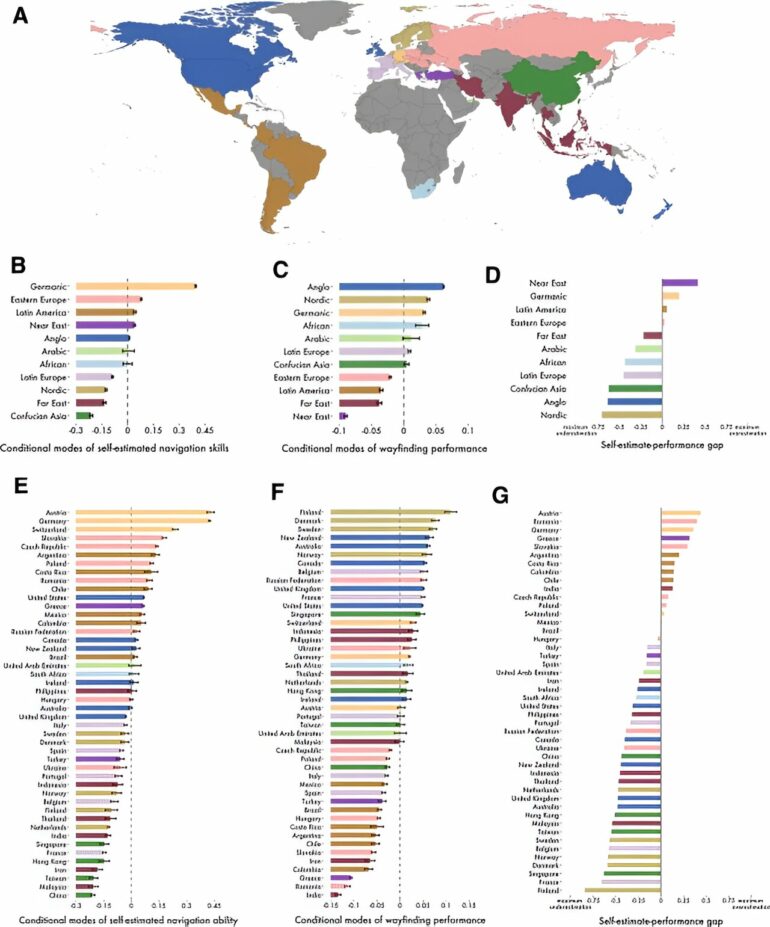People in countries that value masculine traits are more likely to overestimate their navigation abilities, finds a new study led by UCL researchers.
The authors of the new Scientific Reports paper found that those in Germanic and Eastern European countries were most likely to overestimate their navigation skills, while those in Nordic and East Asian countries underestimated their abilities.
The study involved 383,187 people who were playing a mobile game called Sea Hero Quest, which tests wayfinding abilities using a task where game players navigate a boat through a virtual environment to find checkpoints shown on a map. Sea Hero Quest is a citizen science venture designed for neuroscience research, created by Deutsche Telekom in partnership with Alzheimer’s Research UK, UCL, UEA and game developers Glitchers.
The researchers say this is the first study to show a link between cultural values and cognitive performance at such a large scale, pulling together data from 46 countries.
The research team compared participants’ self-estimated abilities to their actual performance, while also analysing how it compared to country-level factors. While people’s own estimates of their abilities were aligned to some extent with their actual performance, the researchers found that in some countries, led by Austria, people had a general tendency to rate their abilities more highly than their actual performance would warrant, while others underestimate their abilities, particularly people in Finland.
The researchers found that cultural factors, particularly gender stereotypes, might play a role in determining how much people overestimate their abilities. They found that in countries which value masculinity and uncertainty avoidance (as determined in prior research), people were particularly prone to overestimate their performance. They also found that country attitudes towards uncertainty avoidance were correlated with overestimation of abilities, in that people in countries where certainty is valued have a tendency to consider themselves good navigators.
Co-lead author Professor Hugo Spiers (UCL Psychology & Language Sciences) explained, “Navigation is often seen as more of a male-oriented skill, so we surmise this is why people in more masculine-affirming countries such as Austria and Germany overestimate their navigation skills.”
Co-lead author Professor Ed Manley (The Bartlett Centre for Advanced Spatial Analysis at UCL and University of Leeds) added, “It was noticeable that certain geographically link[ed] countries grouped together in our data, with Nordic countries consistently performing well and being modest about their abilities.”
The study also revealed that men were significantly more likely to report good navigating skills than women. Men were almost two times more likely than women to rate themselves as very good navigators and approximately half as likely as women to rate their navigating skills as either very bad or bad. Older men (between 60 and 70 years old) were particularly prone to inflated opinions of their own ability, rating their navigating skills more favorably than the youngest men in the study (19–29-year-olds), despite their much poorer actual wayfinding performance.
First author, Ph.D. candidate Szymon Walkowiak (The Bartlett Centre for Advanced Spatial Analysis at UCL) explained, “In our sample, we found that men over 60 were the most overconfident navigators, despite people’s wayfinding performance generally decreasing with age regardless of how good we think we are at navigating.”
The Sea Hero Quest project was designed to aid Alzheimer’s research, by shedding light on differences in spatial navigational abilities, which tends to decline early on in people with Alzheimer’s disease. The researchers are informing the development of dementia diagnostic tests, by establishing how good someone’s navigational ability should be based on characteristics such as age or education.
More information:
Szymon Walkowiak et al, Cultural determinants of the gap between self-estimated navigation ability and wayfinding performance: evidence from 46 countries, Scientific Reports (2023). DOI: 10.1038/s41598-023-30937-w
Provided by
University College London
Citation:
Male stereotypes drive some countries to overestimate navigation ability (2023, August 7)



